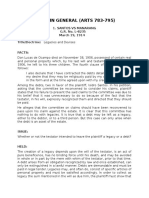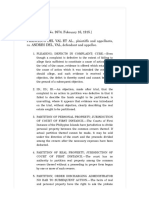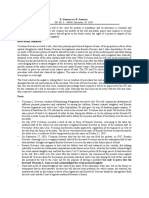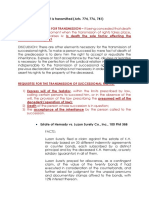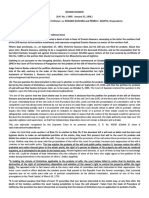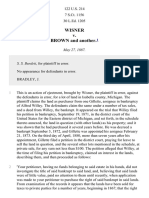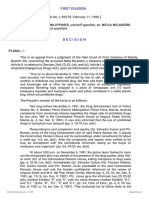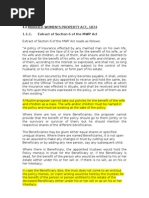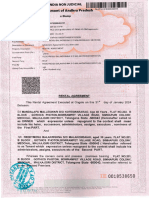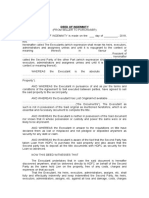0 ratings0% found this document useful (0 votes)
34 viewsReyes v. Grey
Reyes v. Grey
Uploaded by
aitoomuchtvThe document discusses whether a usufructuary right in property can be sold under execution. It analyzes the relevant code sections and determines that a usufructuary right is an 'interest' in property that can be leased or sold by the holder. Therefore, when the plaintiff's usufructuary right was sold under execution as a result of judicial proceedings against him, he no longer had any interest in the property.
Copyright:
© All Rights Reserved
Available Formats
Download as PDF, TXT or read online from Scribd
Reyes v. Grey
Reyes v. Grey
Uploaded by
aitoomuchtv0 ratings0% found this document useful (0 votes)
34 views5 pagesThe document discusses whether a usufructuary right in property can be sold under execution. It analyzes the relevant code sections and determines that a usufructuary right is an 'interest' in property that can be leased or sold by the holder. Therefore, when the plaintiff's usufructuary right was sold under execution as a result of judicial proceedings against him, he no longer had any interest in the property.
Copyright
© © All Rights Reserved
Available Formats
PDF, TXT or read online from Scribd
Share this document
Did you find this document useful?
Is this content inappropriate?
The document discusses whether a usufructuary right in property can be sold under execution. It analyzes the relevant code sections and determines that a usufructuary right is an 'interest' in property that can be leased or sold by the holder. Therefore, when the plaintiff's usufructuary right was sold under execution as a result of judicial proceedings against him, he no longer had any interest in the property.
Copyright:
© All Rights Reserved
Available Formats
Download as PDF, TXT or read online from Scribd
Download as pdf or txt
0 ratings0% found this document useful (0 votes)
34 views5 pagesReyes v. Grey
Reyes v. Grey
Uploaded by
aitoomuchtvThe document discusses whether a usufructuary right in property can be sold under execution. It analyzes the relevant code sections and determines that a usufructuary right is an 'interest' in property that can be leased or sold by the holder. Therefore, when the plaintiff's usufructuary right was sold under execution as a result of judicial proceedings against him, he no longer had any interest in the property.
Copyright:
© All Rights Reserved
Available Formats
Download as PDF, TXT or read online from Scribd
Download as pdf or txt
You are on page 1of 5
[No. 6969. December 20, 1911.
VICENTE REYES, plaintiff and appellant, vs. JOSE GREY
ET AL., defendants and appellees.
1. USUFRUCTUARY RlGHT; SALE UNDER EXECUTION;
"PROPERTY," UNDER SECTION 450, CODE OF CIVIL
PROCEDURE, DEFINED.—The term "property," in
section 450 of the Code of Civil Procedure, comprehends
every species of title, inchoate or complete, legal or
equitable. The said code authorizes the sale, under
execution, of every kind of property and every interest in
property which is, or may be, the subject of private
ownership and transfer. It deals with equitable rights and
interests, as it deals with legal, without anywhere
expressly recognizing or making any distinction between
them.
2. ID.; ID.; RIGHTS OF USUFRUCTUARY, UNDER THE
CIVIL CODE.—Article 480 of the Civil Code provides that:
"The usufructuary may personally enjoy the thing in
usufruct, lease it to another person, or alienate his right to
the usufruct, even for a good consideration * * *."
3. ID.; ID.; A USUFRUCTUARY RIGHT is AN "INTEREST"
IN LAND.—If the usufructuary right is one which may be
leased or sold, it must logically follow that such a right is
an "interest" in real property, within the meaning of
section 450 of the Code of Civil Procedure.
4. ID.; ID.; ATTACHMENT; REAL TEST AS TO WHETHER
PROPERTY CAN BE ATTACHED AND SOLD.—The real
test, as to whether or not property can be attached and
sold upon execution is: Does the judgment debtor hold
such a beneficial interest in the property that he can sell
or otherwise dispose of it for value? If he does, then the
property is subject to execution and to the payment of his
debts. The right of usufruct is such an interest and when
the sheriff, in this case, sold the plaintiff's usufructuary
right by virtue of an execution, the plaintiff had no further
interest in the property.
APPEAL from a judgment of the Court of First Instance of
Manila. Lobingier, J.
The facts are stated in the opinion of the court.
Ramon Salinas, for appellant.
D. R. Williams, for appellees.
74
74 PHILIPPINE REPORTS ANNOTATED
Reyes vs. Grey.
TRENT, J.:
Judgment having been rendered by the Court of First
Instance of the city of Manila, the Hon. Charles S.
Lobingier presiding, dismissing the complaint in this case
upon its merits, the plaintiff appealed.
The only question raised by this appeal is purely one of
law.
Remedios Grey, wife of the plaintiff, died intestate in
1905 without ascendants or descendants, leaving a
surviving husband and one sister and three brothers.
Under the law, the sisters and brothers are called to inherit
all of the estate of the deceased, subject only to the right of
the surviving husband, the plaintiff, to a usufructuary
interest in one-half thereof.
Administration proceedings in the estate of the deceased
wife were not taken out until June 15,. 1907, when Jose
Grey, one of the defendants, was appointed administrator.
In these administration proceedings, the Court of First
Instance of this city issued a decree on December 3, 1910,
declaring that each one of the defendants in the case at bar
was entitled to one-fourth part of the estate of the deceased
Remedios Grey, subject to the plaintiff's (Vicente Reyes')
right to the usufruct.
Prior to the appointment of the administrator for the
estate of the deceased Remedios Grey, and as the result of
certain judicial proceedings had against her surviving
husband (the plaintiff in the case at bar), his usufructuary
interest in the estate of his deceased wife was sold under
execution and deeds issued therefor to the purchaser, the
defendant Jose Grey. Such deeds still subsist in full force
and effect, no steps ever having been taken either to annul
or set them aside or to redeem the interest of the plaintiff
thus sold.
The plaintiff, as surviving husband of the deceased
Remedios Grey, now sues the sister and brothers of his
deceased wife, claiming of them the payment of his
usufructuary interest in the property of the deceased,
basing his claim upon two grounds: first, that the execution
sale and the
75
VOL. 21, DECEMBER 20, 1911. 75
Reyes vs. Grey.
sheriff 's deeds executed pursuant thereto did not divest
him of his usufructuary interest in the property and that
the defendants still remain charged with its payment; and
second, the defendants having failed to appeal from the
order of the probate court dated December 3, 1910, which
order was issued some three years after an attempt was
made to sell under execution the plaintiff's usufructuary
interest, and that order having become final, it settled the
plaintiff's right to a usufructuary interest, and the
defendants can not now deny this fact.
Counsel for the plaintiff now insists that a usufructuary
interest in real property is not such an interest or right as
can be sold under execution. With this contention we can
not agree. Section 450 of the Code of Civil Procedure
provides as follows:
"SEC. 450. Property liable to execution.—All goods, chattels,
moneys, and other property, both real and personal, or any
interest therein of the judgment debtor, not exempt by law, and
all property and rights of property seized and held under
attachment in the action, shall be liable to execution. Shares and
interests in any corporation or company, and debts, credits, and
all other property, both real and personal, or any interest in
either real or personal property, and all other property not
capable of manual delivery, may be attached on execution, in like
manner as upon writs of attachment."
The term "property" as here applied to lands comprehends
every species of title, inchoate or complete; legal or
equitable. This statute authorizes the sale under execution
of every kind of property, and every interest in property
which is, or may be, the subject of private ownership and
transfer. It deals with equitable rights and interests as it
deals with legal, without anywhere expressly recognizing
or making any distinction between them.
Article 480 of the Civil Code reads:
"The usufructuary may personally enjoy the thing in usufruct,
lease it to another person, or alienate his right to the usufruct,
even for a good consideration; * * *."
76
76 PHILIPPINE REPORTS ANNOTATED
Reyes vs. Grey.
If the usufructuary right is one which may be leased or
sold, it must logically and necessarily follow that such a
right is an "interest" in real property within the meaning of
section 450 of the Code of Civil Procedure, above quoted. It
was the plaintiff's usufructuary right in real property
which was sold under execution. This right was conferred
upon him at the death of his wife by operation of law, and
by virtue of such a right he was entitled to receive all the
natural, industrial, and civil fruits of said real property in
usufruct. He was entitled to hold the actual, material
possession of such property during his lifetime, and was
obligated only to preserve its form and substance. In other
words, he was entitled, subject to this restriction, to use the
property as his own. He was the real owner of this interest,
and article 480, supra, conferred upon him the right to
enjoy the possession of the property or lease it to another or
to sell such interest outright. We think the real test, as to
whether or not property can be attached and sold upon
execution is—does the judgment debtor hold such a
beneficial interest in such property that he can sell or
otherwise dispose of it for value? If he does, then the
property is subject to execution and payment of his debts.
The right of usufruct is such an interest, and when the
sheriff sold the plaintiff's usufructuary right by virtue of an
execution, he had no further interest in said property.
The plaintiff's second contention that the defendants, by
failing to appeal from the order of the court in the
administration proceedings dated December 3, 1910,
wherein the right of plaintiff to a usufructuary interest in
the property was recognized, have lost their right to refuse
such payment to him at this time, is not well founded. The
plaintiff had no interest in this property at the time the
probate court issued this order. The order only set out the
fact that under the law the plaintiff was entitled to a
usufructuary interest in one-half of the estate of his
deceased wif e. It was not a finding that in the meantime
the plaintiff had not sold, leased, or otherwise disposed of
or
77
VOL. 21, DECEMBER 20, 1911. 77
Requepo vs. Judge of First Instance and Rosales.
lost such right of participation. This order merely fixed the
legal status of the plaintiff and did not have the effect of
canceling or annuling the sale made by the sheriff. Again,
the plaintiff instituted the action in the case at bar on June
1, 1910, several months prior to the order of December 3,
1910. The right to recover was traversed by the defendants
on July 1 of that same year, and the question was pending
and undetermined at the time the probate court issued its
order.
The validity of the execution sale was not an issue in
those administration proceedings, and the order of
December 3rd cannot, under any circumstances, be held to
affect the validity of such a sale.
The judgment appealed from is therefore affirmed, with
costs against the appellant.
Arellano, C. J., Torres, Mapa, Johnson, Carson, and
Moreland, JJ., concur.
Judgment affirmed.
————————
© Copyright 2020 Central Book Supply, Inc. All rights reserved.
You might also like
- Extrajudicial Settlement of Estate TemplateDocument4 pagesExtrajudicial Settlement of Estate Templatehazel ruaya100% (1)
- Campillo vs. CA DIGESTDocument2 pagesCampillo vs. CA DIGESTStephanie Reyes GoNo ratings yet
- Arroyo v. de Sane: Case SummaryDocument2 pagesArroyo v. de Sane: Case SummaryAgatha ApolinarioNo ratings yet
- Sample Rental AgreementDocument2 pagesSample Rental AgreementcmtssikarNo ratings yet
- Reyes v. GreyDocument3 pagesReyes v. GreyKatherine KatherineNo ratings yet
- Reyes Vs GreyDocument3 pagesReyes Vs Greysamantha koferNo ratings yet
- Vicente Reyes VS Jose Grey Et AlDocument14 pagesVicente Reyes VS Jose Grey Et Alclarris harline eginaNo ratings yet
- G.R. No. 6969Document2 pagesG.R. No. 6969Amapola BulusanNo ratings yet
- Reyes Vs Grey, Bautista Vs MarcosDocument4 pagesReyes Vs Grey, Bautista Vs MarcosRZ ZamoraNo ratings yet
- Petitioner vs. vs. Respondents Herberto A. Manzanilla Noel L. MalundaDocument9 pagesPetitioner vs. vs. Respondents Herberto A. Manzanilla Noel L. MalundaRuthImperialNo ratings yet
- 123350-1999-Reyes v. Court of Appeals20210528-12-1pqv2i4Document10 pages123350-1999-Reyes v. Court of Appeals20210528-12-1pqv2i4Bonnet David-santosNo ratings yet
- Succession Case DigestsDocument9 pagesSuccession Case DigestsCMGNo ratings yet
- 81 Jalbuena V LizarragaDocument2 pages81 Jalbuena V LizarragaAlex VitasaNo ratings yet
- (No. 9374. February 16, 1915.) FRANCISCO DEL VAL ET AL., Plaintiffs and AppellantsDocument10 pages(No. 9374. February 16, 1915.) FRANCISCO DEL VAL ET AL., Plaintiffs and AppellantsjoyeduardoNo ratings yet
- Testate Estate of The Deceased Mariano Molo y Legaspi PDFDocument10 pagesTestate Estate of The Deceased Mariano Molo y Legaspi PDFLarssen IbarraNo ratings yet
- Rule 91: Escheat A. Section 1: BrownDocument16 pagesRule 91: Escheat A. Section 1: BrownAure ReidNo ratings yet
- Waite vs. Peterson Et Al.Document3 pagesWaite vs. Peterson Et Al.jはだジャミルNo ratings yet
- Titong v. Court of AppealsDocument12 pagesTitong v. Court of Appealsnewin12No ratings yet
- Adille Vs CADocument3 pagesAdille Vs CANina Khristinne D. AranetaNo ratings yet
- 118580-2000-Development Bank of The Phils. v. Court ofDocument15 pages118580-2000-Development Bank of The Phils. v. Court ofShairaCamilleGarciaNo ratings yet
- 58 Titong v. CADocument10 pages58 Titong v. CASheryl CortesNo ratings yet
- Lilia Sanchez Vs Court of AppealsDocument2 pagesLilia Sanchez Vs Court of AppealsSanchinoDeeNo ratings yet
- Supreme Court: Ross, Lawrence and Selph For Appellant. Camus and Delgado For AppelleeDocument2 pagesSupreme Court: Ross, Lawrence and Selph For Appellant. Camus and Delgado For AppelleeGlenn Vincent Octaviano GuanzonNo ratings yet
- CIVIL-LAW-Updates-in-Civil-Law-Dean Eduardo J.F. AbellaDocument73 pagesCIVIL-LAW-Updates-in-Civil-Law-Dean Eduardo J.F. AbellaKen LimNo ratings yet
- Guevarra V GuevarraDocument2 pagesGuevarra V GuevarraJade ViguillaNo ratings yet
- Lausa VS Quilaton 767 Scra 399 PDFDocument26 pagesLausa VS Quilaton 767 Scra 399 PDFJenny100% (1)
- Assignment No. 8 - Civrev PerfamDocument232 pagesAssignment No. 8 - Civrev PerfamptdwnhroNo ratings yet
- Succession Cases 1Document15 pagesSuccession Cases 1Wilfredo Guerrero IIINo ratings yet
- Possession DefinitionDocument5 pagesPossession DefinitionAubrey Magalona AmoraNo ratings yet
- Immaculata Vs NavarroDocument1 pageImmaculata Vs Navarromcris101No ratings yet
- Vasquez v. Li Seng GiapDocument3 pagesVasquez v. Li Seng GiapKcompacionNo ratings yet
- Treyes V LarlarDocument14 pagesTreyes V LarlarJoatham GenovisNo ratings yet
- Retro To Certain 3rd Persons, Period of Repurchase Being 3 Years, But She Died inDocument30 pagesRetro To Certain 3rd Persons, Period of Repurchase Being 3 Years, But She Died inMylaCambriNo ratings yet
- Property Cases II Full Text 10 Waite vs. Peterson To 17 Lagazo vs. SorianoDocument46 pagesProperty Cases II Full Text 10 Waite vs. Peterson To 17 Lagazo vs. SorianomastaacaNo ratings yet
- JURISPRUDENCE Buyer in Good FaithDocument8 pagesJURISPRUDENCE Buyer in Good FaithAnge Buenaventura Salazar100% (2)
- Del Rosario Vs Ferrer DigestDocument7 pagesDel Rosario Vs Ferrer DigestMariaNo ratings yet
- #19 Dy Yieng SEANGIO, Barbara D. SEANGIO and Virginia D. SEANGIODocument3 pages#19 Dy Yieng SEANGIO, Barbara D. SEANGIO and Virginia D. SEANGIOJui ProvidoNo ratings yet
- Reymundo v. SunicoDocument3 pagesReymundo v. SunicoKym AlgarmeNo ratings yet
- Guevara vs. GuevaraDocument2 pagesGuevara vs. GuevaraLucas Gabriel Johnson100% (2)
- LTD Case DigestsDocument4 pagesLTD Case DigestsDatu TahilNo ratings yet
- QUESTION: ELEMENTS FOR TRANSMISSION - It Being Conceded That DeathDocument19 pagesQUESTION: ELEMENTS FOR TRANSMISSION - It Being Conceded That DeathKen LimNo ratings yet
- Vasquez vs. Giap and Li Seng Giap & SonsDocument9 pagesVasquez vs. Giap and Li Seng Giap & SonsRMC PropertyLawNo ratings yet
- Milagros Hernandez vs. Edwina Ocampo Et. Al.Document3 pagesMilagros Hernandez vs. Edwina Ocampo Et. Al.Charmaine MejiaNo ratings yet
- Go Ong vs. Ca G.R. No. 75884 September 24, 1987 FACTS: 2 Parcels of Land Under 1 TCT Are Owned by Alfredo and When He Died, His WifeDocument10 pagesGo Ong vs. Ca G.R. No. 75884 September 24, 1987 FACTS: 2 Parcels of Land Under 1 TCT Are Owned by Alfredo and When He Died, His WifeKrishna AdduruNo ratings yet
- 21.11 Naval V CADocument3 pages21.11 Naval V CAFrankel Gerard MargalloNo ratings yet
- 1 Del Val Vs Del Val Escra FTDocument4 pages1 Del Val Vs Del Val Escra FTDianne YcoNo ratings yet
- Guevara Vs GuevaraDocument2 pagesGuevara Vs GuevaraClaudine SumalinogNo ratings yet
- Case Digest 8-15Document6 pagesCase Digest 8-15kristel jane caldozaNo ratings yet
- Wisner v. Brown, 122 U.S. 214 (1887)Document4 pagesWisner v. Brown, 122 U.S. 214 (1887)Scribd Government DocsNo ratings yet
- 1.11 Civil LawsDocument74 pages1.11 Civil LawsfgNo ratings yet
- Montelibano vs. Severino (Civil Case No. 902 of The Court of First Instance of Occidental Negros and Which Forms ADocument1 pageMontelibano vs. Severino (Civil Case No. 902 of The Court of First Instance of Occidental Negros and Which Forms AJam Mua MacalangganNo ratings yet
- Ross, Lawrence and Selph For Appellant. Camus and Delgado For AppelleeDocument12 pagesRoss, Lawrence and Selph For Appellant. Camus and Delgado For Appelleebrida athenaNo ratings yet
- de La Peña Vs Hidalgo, G.R. No. L-5486Document18 pagesde La Peña Vs Hidalgo, G.R. No. L-5486Jade ClementeNo ratings yet
- Assignment 8Document24 pagesAssignment 8Kriston LipatNo ratings yet
- Owner (Lot-1135-A) (Lot-53-A) (Lot-1444-A)Document4 pagesOwner (Lot-1135-A) (Lot-53-A) (Lot-1444-A)Earl Mercado CalingacionNo ratings yet
- Guevara vs. Guevara 74 Phil 479 (1943)Document2 pagesGuevara vs. Guevara 74 Phil 479 (1943)Raiza SarteNo ratings yet
- Adille v. CA, 157 SCRA 455Document8 pagesAdille v. CA, 157 SCRA 455BernsNo ratings yet
- Acap Vs CADocument20 pagesAcap Vs CAJohnday MartirezNo ratings yet
- Property Usufruct Batch 1Document8 pagesProperty Usufruct Batch 1Bianca Marie FlorNo ratings yet
- Naval V CaDocument2 pagesNaval V CaLawstudentArellanoNo ratings yet
- Buebos Vs People GR 163938 Mar 28 2008Document37 pagesBuebos Vs People GR 163938 Mar 28 2008Kim ArizalaNo ratings yet
- Constitution of the State of Minnesota — 1964 VersionFrom EverandConstitution of the State of Minnesota — 1964 VersionNo ratings yet
- Constitution of the State of Minnesota — 1960 VersionFrom EverandConstitution of the State of Minnesota — 1960 VersionNo ratings yet
- Bustamante v. Rosel (G.R. No. 126800)Document9 pagesBustamante v. Rosel (G.R. No. 126800)aitoomuchtvNo ratings yet
- Korea Exchange Bank v. Filkor Business Integrated, Inc., Et Al. (G.R. No. 138292)Document8 pagesKorea Exchange Bank v. Filkor Business Integrated, Inc., Et Al. (G.R. No. 138292)aitoomuchtvNo ratings yet
- Ong v. Roban Lending Corporation (G.R. No. 172592)Document11 pagesOng v. Roban Lending Corporation (G.R. No. 172592)aitoomuchtvNo ratings yet
- International Catholic Migration Commission vs. Calleja, 190 SCRA 130, G.R. No. 85750, G.R. NO. 89331 September 28, 1990Document19 pagesInternational Catholic Migration Commission vs. Calleja, 190 SCRA 130, G.R. No. 85750, G.R. NO. 89331 September 28, 1990aitoomuchtvNo ratings yet
- Central Negros Electric Cooperative, Inc. vs. Sec. of DOLE, 201 SCRA 584, G.R. No. 94045 September 13, 1991Document10 pagesCentral Negros Electric Cooperative, Inc. vs. Sec. of DOLE, 201 SCRA 584, G.R. No. 94045 September 13, 1991aitoomuchtvNo ratings yet
- Holy Child Catholic School vs. Sto. Tomas, 701 SCRA 589, G.R. No. 179146 July 23, 2013Document45 pagesHoly Child Catholic School vs. Sto. Tomas, 701 SCRA 589, G.R. No. 179146 July 23, 2013aitoomuchtvNo ratings yet
- GSIS Family Bank Employees Union vs. Villanueva, 891 SCRA 206, G.R. No. 210773 January 23, 2019Document39 pagesGSIS Family Bank Employees Union vs. Villanueva, 891 SCRA 206, G.R. No. 210773 January 23, 2019aitoomuchtvNo ratings yet
- Medicard Philippines, Inc. vs. CIR (G.R. No. 222743)Document21 pagesMedicard Philippines, Inc. vs. CIR (G.R. No. 222743)aitoomuchtvNo ratings yet
- Amendments To The 2005 Revised Rules of The Court of Tax Appeals - (Revised Rules of The Court of Tax AppealsDocument19 pagesAmendments To The 2005 Revised Rules of The Court of Tax Appeals - (Revised Rules of The Court of Tax AppealsaitoomuchtvNo ratings yet
- AC Corporation v. CIR (CTA Case No. 8485)Document29 pagesAC Corporation v. CIR (CTA Case No. 8485)aitoomuchtvNo ratings yet
- Revenue Regulations No. 07-18Document2 pagesRevenue Regulations No. 07-18aitoomuchtvNo ratings yet
- People v. NicandroDocument8 pagesPeople v. NicandroaitoomuchtvNo ratings yet
- Law of Property Exam Paper 2019Document3 pagesLaw of Property Exam Paper 2019hontoskokoNo ratings yet
- Revised Note On MWP ActDocument6 pagesRevised Note On MWP ActChess LordNo ratings yet
- Devi V FrancisDocument9 pagesDevi V FrancisChin Kuen YeiNo ratings yet
- Public NoticesDocument1 pagePublic NoticespangbalitaNo ratings yet
- Final HG - G5 - Q3 - Module-8Document11 pagesFinal HG - G5 - Q3 - Module-8Jacquiline TanNo ratings yet
- Trespass To LandDocument5 pagesTrespass To Landparijat_96427211No ratings yet
- Tapping Exercise - 16th NotesDocument1 pageTapping Exercise - 16th NotesRic BiñarNo ratings yet
- Equity Course AlexDocument20 pagesEquity Course AlexAronyu ArthurNo ratings yet
- Legitimate Testator Testate Intestate Legitimate Child AloneDocument5 pagesLegitimate Testator Testate Intestate Legitimate Child AlonefembarriosNo ratings yet
- Intellectual Property Code of The Philippines Republic Act No. 8293, As Amended by Ra 10372Document23 pagesIntellectual Property Code of The Philippines Republic Act No. 8293, As Amended by Ra 10372Donita100% (1)
- Introduction To Land Law in GhanaDocument12 pagesIntroduction To Land Law in Ghanamelittaboateng8No ratings yet
- IP Law Outline For Week 2 2022Document3 pagesIP Law Outline For Week 2 2022Joon DyNo ratings yet
- 1637-Article Text-3031-1-10-20201124Document31 pages1637-Article Text-3031-1-10-20201124Anmaw mekonnenNo ratings yet
- Wills Digest PDFDocument9 pagesWills Digest PDFChristian John Dela CruzNo ratings yet
- Introduccion Al Curso 'Estabilidad y Control de La Frecuencia en Sistemas de Potencia Modernos'Document26 pagesIntroduccion Al Curso 'Estabilidad y Control de La Frecuencia en Sistemas de Potencia Modernos'Diana Isabel BarcoNo ratings yet
- Agricultural Lands-Mr. Tarunkumar KhatriDocument27 pagesAgricultural Lands-Mr. Tarunkumar KhatriAtul ShahNo ratings yet
- Rental AgreementDocument2 pagesRental Agreementkkumarhyd89No ratings yet
- Special Proceedings ReviewerDocument31 pagesSpecial Proceedings ReviewerJacobSNo ratings yet
- Understanding Trademark Infringement Defences in IndiaDocument11 pagesUnderstanding Trademark Infringement Defences in IndiaEunha MinNo ratings yet
- Accession Natural: Republic of The Philippines vs. Arcadio Santos Iii and Santos Jr. G.R. NO. 160453 NOVEMBER 12, 2012Document15 pagesAccession Natural: Republic of The Philippines vs. Arcadio Santos Iii and Santos Jr. G.R. NO. 160453 NOVEMBER 12, 2012catherine mallariNo ratings yet
- Final-Legal Opinion - Basavaiah-Arithra PropertiesDocument10 pagesFinal-Legal Opinion - Basavaiah-Arithra PropertiesGangadhar MulgundNo ratings yet
- Exponents Worksheet: SolveDocument2 pagesExponents Worksheet: Solveappalachianmountains1No ratings yet
- Proclamation No. 935Document3 pagesProclamation No. 935roy rubaNo ratings yet
- Deed of IndemnityDocument2 pagesDeed of IndemnityMail PostplaceNo ratings yet
- CA Bar Property OutlineDocument10 pagesCA Bar Property OutlinechrisngoxNo ratings yet
- Estates Primer Problem SetDocument8 pagesEstates Primer Problem Setjonny smithyNo ratings yet
- 947 - Section 13 and 14Document27 pages947 - Section 13 and 14koushiki mishraNo ratings yet











